Sudan
The U.S. special envoy for Sudan said Thursday, just days after his first visit to the war-wrecked country since taking his post, that he doesn't see enough of “political appetite” from the warring parties to resolve the conflict.
The African nation plunged into conflict in mid-April 2023, when long-simmering tensions between its military and paramilitary leaders broke out in the capital of Khartoum and spread to other regions, including western Darfur.
The fighting has left tens of thousands dead, forced millions from their homes, and pushed a large swath of the population to starvation.
Tom Perriello, who was appointed as special envoy in February, travelled to Port Sudan on Monday to meet with Sudanese officials, including the head of the military Gen. Abdel Fattah Burhan, whose troops have been battling the rival paramilitary Rapid Support Forces around the country for the past 19 months.
READ ALSO: Sudan war fuelled by weapons from foreign actors in violation of sanctions - UN
Multiple attempts to broker a cease-fire have fallen apart, most recently in August, when the Sudanese military refused to attend U.S.-mediated talks in Geneva. Since then, fighting has only accelerated, and RSF forces have been accused by the United Nations of carrying out atrocities including killings of civilians and rapes in several parts of the country.
“We do not yet see enough political appetite from the parties to find a real resolution to this conflict,” Perriello said in an interview with The Associated Press in Rome. He said any solution “has got to be about handing control back to the people.”
Sudan had been trying to establish a civilian government after a popular uprising forced the removal of longtime dictator Omar al-Bashir in 2019. The short-lived transition to democracy was derailed when Burhan and Gen. Mohammed Hamdan Dagalo, commander of the RSF, joined forces to carry out a military takeover in 2021.
But Burhan and Dagalo soon fell out, and their long-simmering struggle for control erupted into battles in Khartoum in April 2023 and spread the other parts of the country.
Since then, more than 20,000 people have been killed in the conflict, according to the U.N.. Some 14 million people — 30% of the population — have been forcibly displaced, either to other parts of the country or abroad in what the U.N. says is one of the world's worst displacement crises.
The U.N. recently warned that the country has been pushed to the brink of famine, and more than 26.5 million people face acute hunger.
“The numbers are so large that you can’t even get your head around the scale of human suffering,” Perriello said. He decried the situation in which the warring parties continue to commit atrocities while civilians are trapped in the chaos.
“What we know is the numbers are astronomical,” Perriello noting that, “the death toll is probably more than anything that’s been estimated.”
He pointed to reported atrocities carried out by RSF fighters last month in the Gezira state, southeast of Khartoum. “These are horrific, horrific abuses against women and children, in this case, primarily committed by the Rapid Support Forces, and multiple attacks on civilians, murdering of civilians," he said.
During his visit, Perriello met with members of Sudanese civil society and humanitarian aid workers in an effort to improve movement of food and medicines to people across the country.
He said the United States is working to stop countries that are arming the warring parties despite a U.N. arms embargo.
Sudan’s ruling Sovereign Council, led by Burhan, accuses the United Arab Emirates, a U.S. ally, of arming the RSF — a charge that a U.N. panel of experts said was credible, though the UAE denies it. The RSF has also reportedly received support from Russia’s Wagner mercenary group.
“We won’t speak to specific conversations, but the United States has been very clear with countries all over the world that we believe it’s time to stop fueling this war with more weapons,” Perriello said.
Burhan has received Russian support and is a close ally of neighbouring Egypt and its president, former army chief Abdel-Fattah el-Sissi. In February, Sudan’s foreign minister held talks in Tehran with his Iranian counterpart amid unconfirmed reports of drone purchases for government forces.
“We have way too many countries that are pouring weapons into Sudan who should be pouring in food and medicine," Perriello said. "We have way too many countries deciding to get involved, not in the interests of the Sudanese people, but to take advantage of the fragility of the state.”
Perriello, who has worked on crises in the Democratic Republic of the Congo, Afghanistan and Sierra Leone, said he had never been involved in a disaster on such a massive scale that is getting so little attention from the rest of the world.




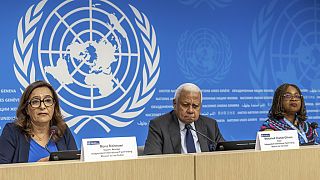
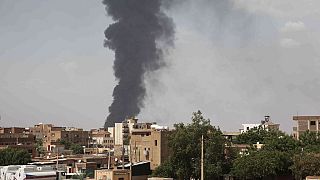
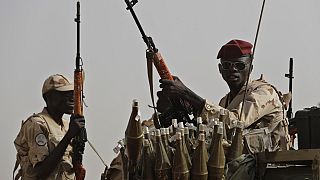
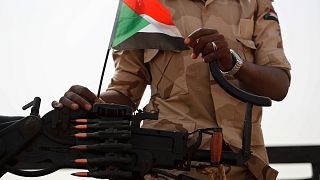
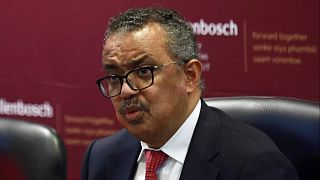
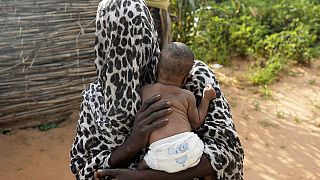



01:49
Sudanese refugees in Chad face deepening humanitarian crisis
01:11
Sudan: U.S. sanctions over alleged chemical weapons use come into force
01:39
Driven to starvation, Sudanese eat weeds and plants to survive
02:20
John Cena and Idris Elba-starring action film "Heads of State" premieres in New York
01:00
Animal shelters in the US use live music to soothe anxious pets
00:58
Israel-Iran ceasefire appears to hold amid tensions and diplomatic juggling